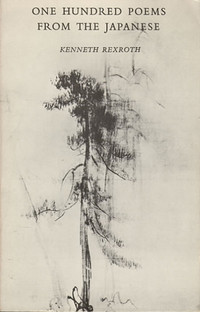Status
Available
Genres
Publication
New York : New Directions
Description
The poems are drawn chiefly from the traditional Manyoshu, Kokinshu and Hyakunin Isshu collections, but there are also examplaes of haiku and other later forms. The sound of the Japanese texts i reproduced in Romaji script and the names of the poets in the calligraphy of Ukai Uchiyama. The translator's introduction gives us basic background on the history and nature of Japanese poetry, which is supplemented by notes on the individual poets and an extensive bibliography.
User reviews
LibraryThing member tombrinck
This is a selection of classic Japanese poetry in translation (the original Japanese is there too). The poems, mostly tanka/waka, are not my favorite selection -- mostly court poetry without a lot of the intensity nor the imagery common in later Japanese haiku and tanka. Nevertheless, the
Show More
translations seem fairly good and the poems are all quite accessible. Show Less
LibraryThing member pocketmermaid
I borrowed this from the library during National Poetry Month (April) when I realized I hadn't familiarized myself tankas in a long while. A tanka is one of the short poetry forms (31 syllables, broken in to five 5-7-5-5-5 syllable lines) that the Japanese poets made famous. There's also so haiku,
Show More
and longer poems as well. All the poems have the original Japanese and English translation side by side.These poems are meant to be simple little caps to the previous evening, written the morning after. I loved the simplicity in the topics, and the relatability of the poetry even after surviving hundreds of years. Show Less
LibraryThing member stillatim
An ideal introduction to classical Japanese poetry, if my own experience is anything to go by. Rexroth's introductory essay won me over pretty easily by pointing out that the differences between Japanese and 'Western' poetry aren't all that great (though he wasted some of my good will by then
More importantly, the essay explains the forms, puts them in historical context, deals with some of the problems a reader is likely to encounter (not many unless you really need to know every implication of every word).
Rexroth's selection is very good: even if, like me, you grow easily bored by love poetry, you'll soon find something more to your taste.
I go out of the darkness
Onto a road of darkness
Lit only by the far off
Moon on the edge of the mountains (Izumi Shikibu)
Or,
As certain as color
Passes from the petal,
Irrevocable as flesh,
The gazing eye falls through the world. (Ono No Komachi)
Or even a love poem metallic enough for my pallet:
I dreamed I held
A sword against my flesh.
What does it mean?
It means I shall see you soon. (Lady Kasa)
And then there are the mini biographies at the end of the text, which are informative and sometimes helpful for understanding the poems; the lovely production of the book itself; and the very odd idea of including representations of Japanese pronunciation, which I suspect doesn't really help anyone, but is still charming. Lady's Kasa's poem supposedly runs:
Tsurugi tachi
Mi ni tori sou to
Ime ni mitsu
Nani no satoshi zomo
Kimi ni awamu tame
Now for anyone who doesn't know Japanese, and possibly even for people who do, that is *truly* the essence of poetry, unalloyed by extra-poetical considerations like, you know. Meaning.
So, to state the obvious, I have no idea how well Rexroth has translated these poems. But I do know that his versions are readable and coherent.
The white chrysanthemum
Is disguised by the first frost.
If I wanted to pick one
I could find it only by chance. (Oshikochi No Mitsune)
Show More
describing Japanese poetry as "purer, more essentially poetic... less distracted by non-poetic considerations," which is like saying that my kitchen table is less distracted by non-table considerations than your picnic bench. More importantly, the essay explains the forms, puts them in historical context, deals with some of the problems a reader is likely to encounter (not many unless you really need to know every implication of every word).
Rexroth's selection is very good: even if, like me, you grow easily bored by love poetry, you'll soon find something more to your taste.
I go out of the darkness
Onto a road of darkness
Lit only by the far off
Moon on the edge of the mountains (Izumi Shikibu)
Or,
As certain as color
Passes from the petal,
Irrevocable as flesh,
The gazing eye falls through the world. (Ono No Komachi)
Or even a love poem metallic enough for my pallet:
I dreamed I held
A sword against my flesh.
What does it mean?
It means I shall see you soon. (Lady Kasa)
And then there are the mini biographies at the end of the text, which are informative and sometimes helpful for understanding the poems; the lovely production of the book itself; and the very odd idea of including representations of Japanese pronunciation, which I suspect doesn't really help anyone, but is still charming. Lady's Kasa's poem supposedly runs:
Tsurugi tachi
Mi ni tori sou to
Ime ni mitsu
Nani no satoshi zomo
Kimi ni awamu tame
Now for anyone who doesn't know Japanese, and possibly even for people who do, that is *truly* the essence of poetry, unalloyed by extra-poetical considerations like, you know. Meaning.
So, to state the obvious, I have no idea how well Rexroth has translated these poems. But I do know that his versions are readable and coherent.
The white chrysanthemum
Is disguised by the first frost.
If I wanted to pick one
I could find it only by chance. (Oshikochi No Mitsune)
Show Less
Language
Original language
Japanese
